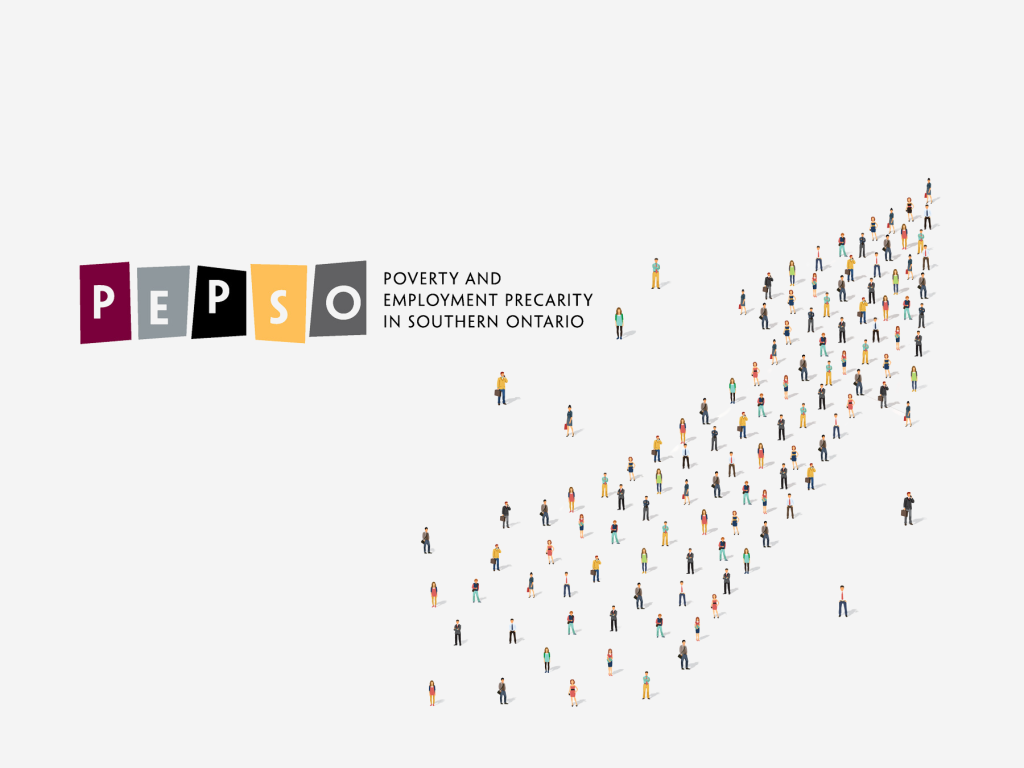Poverty and Employment Precarity in Southern Ontario (PEPSO)

Poverty and Employment Precarity in Southern Ontario (PEPSO)
The Poverty and Employment Precarity in Southern Ontario (PEPSO) research project was a joint university-community initiative led by United Way Toronto & York Region and McMaster University. This initiative was a partnership of over 30 university, community sector, labour, government, and media partners.
Beginning in 2010, the goal of the PEPSO project was to meet the research need for data on trends in precarious employment and to encourage policy debate and further research. PEPSO successfully met these goals by garnering significant media coverage, influencing key policy decisions, expanding existing knowledge, and serving as a foundation for further research.
Expandable List
Lewchuk, Wayne, Michelynn Lafleche, Diane Dyson, Luin Goldring, Alan Meisner, Stephanie Procyk, Dan Rosen, John Shields, Peter Viducis and Sam Vrankulj. “It’s More than Poverty: Employment Precarity and Household Well-being”. The Poverty and Employment Precarity in Southern Ontario (PEPSO) Research Group. McMaster University, Hamilton, ON, 2013.
Lewchuk, Wayne, Michelynn Lafleche, Stephanie Procyk, Charlene Cook, Diane Dyson, Luin Goldring, Karen Lior, Alan Meisner, John Shields, Anthony Tambureno and Peter Viducis. “The Precarity Penalty: The impact of employment precarity on individuals, households and communities- and what to do about it”. The Poverty and Employment Precarity in Southern Ontario (PEPSO) Research Group. McMaster University, Hamilton, ON, 2015.
Lewchuk, Wayne, Stephanie Procyk, Michelynn Lafleche, Diane Dyson, Luin Goldring, John Shields, Peter Viducis. “Getting Left Behind: Who gained and who didn’t in an improving labour market”. (The Poverty and Employment Precarity in Southern Ontario (PEPSO) Research Group. McMaster University, Hamilton, ON, 2018.
The Precarity and its Impact on Household and Community Well-being
The core of the CURA project’s case study was conducting two population-based surveys of working-age adults (25-65) in the GTA and Hamilton. These surveys aimed to assess the relationship between precarious employment and individual, family, and community well-being.
Resisting Precarity
This case study investigates various approaches individuals, unions and/or collectives have used to resist or overcome becoming “victimized” by precarious employment. Five distinct examples of collective responses to precarity are being examined.
Precarity in the Community Services Sector
This project explores the impacts of precarity in the non-profit social services sector (NPSS), examining how precarity operates, how it is understood and experienced, and identifying promising practices that might offer solutions.
Migrant Labour- Undocumented Labour
This case study centers on two research projects on the impact of precarity on the families of migrant workers from parts of the global south who come to work in southern Ontario.
Impact of High Levels of Precarity on Urban Neighbourhood Economies and Particular Populations
This study aimed to understand how precarious employment is changing the urban social and economic landscape in select Southern Ontario communities and its impact on specific populations and their livelihoods.
Skills Mismatch and Precarious Employment Faced by Racialized Refugee and Immigrant Women in Toronto: Racialization and Gender Politics of Current Shifts
This project investigates systemic challenges faced by racialized newcomer women in securing stable employment in their field.
The Employment Precarity Index being used by the Ontario Trillium Foundation to help understand how much their employment services grantees are able to assist their clients.
PEPSO featured as a case study by McMaster University’s Impacts Unpacked series to demonstrate best practices in turning research into action.
With consultation from PEPSO research, the Toronto Public Library Workers Union (Local 4948) launched a campaign on precarious employment in the library system.
U.S-based organization, PR News recognized top work in non-profit communications. United Way Toronto’s public relations work on It’s More than Poverty was nominated in the category of Best External Publication or Report. Winners and honourable mentions were celebrated at the National Press Club in Washington, D.C.
PEPSO partner organization, Access Alliance, launched a campaign to build community capacity to use research evidence to advocate for change.
Martin, J. C., Lewchuk, W. (2017) The Game is Getting Harder: A study of Hamilton millennials and work in a neoliberal economy. Page Pro Proofreading.
Martin, J. C. (2016). The Game: Easier or Tougher? A Study of Hamilton Millenials and Self-Employment. School of Labour Studies, McMaster University, Hamilton, ON.
Martin, J. C., Lewchuk, W. (2018) The Generation Effect: Millennials, employment precarity and the 21st Century workplace. McMaster University and PEPSO.
Martin, J. C., Lewchuk, W. (2018) The Generation Effect: Millennials, employment precarity and the 21st Century workplace – Exec. Summary. McMaster University and PEPSO.
Perreault-Laird, Jordan (2018). Gendered Precarity: Millennial Mothers’ Experiences of Taking Pregnancy/Parental Leave in a Precarious Labour Market. McMaster University and PEPSO.
